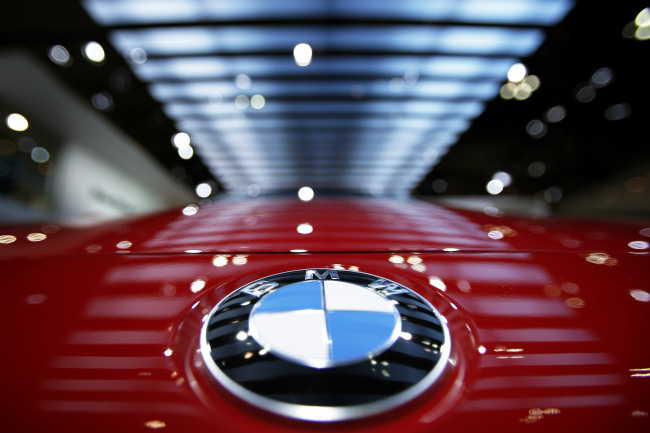
Bayerische Motoren Werke AG, the largest maker of luxury cars, is recalling 489,000 vehicles worldwide due to a possible engine-bolt defect, widening a repair program that was initiated in China.
No accidents or injuries have been reported related to the fault in some six-cylinder engines, Bernhard Santer, a spokesman for the Munich-based manufacturer, said Friday by phone. Vehicles affected include 156,000 cars in North America, as well as 232,098 autos in China that were announced for recall within the past month.
Recalls are increasing worldwide as regulators tighten scrutiny and carmakers seek to avoid harm to their reputations after questions about whether flaws are disclosed soon enough. Toyota Motor Corp. issued its second-biggest recall announcement earlier this month. General Motors Co. said Thursday it anticipates taking a first-quarter charge of $1.3 billion primarily for the cost of recall-related repairs.
“What we’re seeing these days is a culture change in the automotive industry,” said Christoph Stuermer, lead analyst for PricewaterhouseCoopers’s Autofacts forecasting service. “The general quality of cars has improved significantly. But manufacturers are increasingly recalling vehicles as a precautionary measure.”
Most of BMW’s lineup is available with six-cylinder engines, including cars such as the top-of-the-line 7-Series and up-market 5-Series sedans and the X3 and X5 sport utility vehicles. Santer did not provide details on the models being called in for repairs.
In affected cars, a light may come on advising the driver to have the engine checked, Santer said. The vehicle can still be driven to the nearest repair garage with reduced engine power, he said.
GM is recalling 2.59 million vehicles to fix potentially faulty ignition switches following incidents that caused cars to lose power, including accidents linked to at least 13 deaths. Detroit-based GM is being investigated by U.S. authorities over questions of why the notice took place years after the flaw was first detected. The company has suspended two engineers from the team that worked on the components.
Toyota, roiled by a crisis over unintended acceleration in 2009 and 2010, earlier this week announced it was recalling 6.39 million cars to fix defects such as cables that could prevent airbags from deploying and windshield-wiper motors that may break down and cause brake lamps to stop working. Fiat SpA’s Chrysler detected a fault in 867,795 Jeep Grand Cherokee and Dodge Durango SUVs and is installing a shield to protect brake boosters from water corrosion.
Herbert Diess, the head of BMW’s research and development, said at a March 19 press conference that the manufacturer’s data on breakdowns and guarantee services show vehicle quality is at “a good level.” While the number of recalls has “hardly changed” in recent years, “the number of affected vehicles per recall went up.”
Such increases may become an industry trend because of widening standardization of technology and components used across a range of vehicles, Chief Executive Officer Norbert Reithofer said at the briefing. (Bloomberg)
No accidents or injuries have been reported related to the fault in some six-cylinder engines, Bernhard Santer, a spokesman for the Munich-based manufacturer, said Friday by phone. Vehicles affected include 156,000 cars in North America, as well as 232,098 autos in China that were announced for recall within the past month.
Recalls are increasing worldwide as regulators tighten scrutiny and carmakers seek to avoid harm to their reputations after questions about whether flaws are disclosed soon enough. Toyota Motor Corp. issued its second-biggest recall announcement earlier this month. General Motors Co. said Thursday it anticipates taking a first-quarter charge of $1.3 billion primarily for the cost of recall-related repairs.
“What we’re seeing these days is a culture change in the automotive industry,” said Christoph Stuermer, lead analyst for PricewaterhouseCoopers’s Autofacts forecasting service. “The general quality of cars has improved significantly. But manufacturers are increasingly recalling vehicles as a precautionary measure.”
Most of BMW’s lineup is available with six-cylinder engines, including cars such as the top-of-the-line 7-Series and up-market 5-Series sedans and the X3 and X5 sport utility vehicles. Santer did not provide details on the models being called in for repairs.
In affected cars, a light may come on advising the driver to have the engine checked, Santer said. The vehicle can still be driven to the nearest repair garage with reduced engine power, he said.
GM is recalling 2.59 million vehicles to fix potentially faulty ignition switches following incidents that caused cars to lose power, including accidents linked to at least 13 deaths. Detroit-based GM is being investigated by U.S. authorities over questions of why the notice took place years after the flaw was first detected. The company has suspended two engineers from the team that worked on the components.
Toyota, roiled by a crisis over unintended acceleration in 2009 and 2010, earlier this week announced it was recalling 6.39 million cars to fix defects such as cables that could prevent airbags from deploying and windshield-wiper motors that may break down and cause brake lamps to stop working. Fiat SpA’s Chrysler detected a fault in 867,795 Jeep Grand Cherokee and Dodge Durango SUVs and is installing a shield to protect brake boosters from water corrosion.
Herbert Diess, the head of BMW’s research and development, said at a March 19 press conference that the manufacturer’s data on breakdowns and guarantee services show vehicle quality is at “a good level.” While the number of recalls has “hardly changed” in recent years, “the number of affected vehicles per recall went up.”
Such increases may become an industry trend because of widening standardization of technology and components used across a range of vehicles, Chief Executive Officer Norbert Reithofer said at the briefing. (Bloomberg)
-
Articles by Korea Herald








![[Hello India] Hyundai Motor vows to boost 'clean mobility' in India](http://res.heraldm.com/phpwas/restmb_idxmake.php?idx=644&simg=/content/image/2024/04/25/20240425050672_0.jpg&u=)











